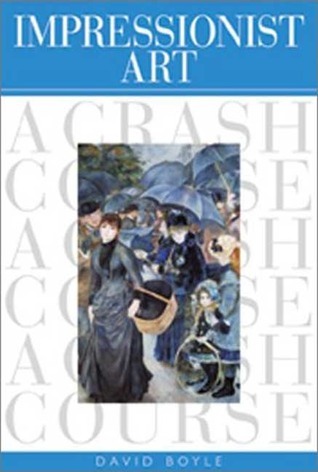
For a so-called art movement, impressionist painters were a very dissimilar group. Monet and Renoir liked people-watching and hanging out with the jet set at La Brenouillière. Degas got his kicks from ballet dancers, working models, and racehorses. One thing these artists all had in common, however, was a love of bright, big, bold dabs of it. Impressionist A Crash Course provides lots of color as well as hundreds of amusing anecdotes and little-known facts about this popular period. Readers will not only be able to tell the Manets from the Monets, but will quickly become experts on the many mini-movements within this popular style. This fun-loving guide is appealing, compact, lavishly illustrated, and conveniently organized chronologically spread by spread. For anyone who can’t tell the water lilies from the haystacks, Impressionist A Crash Course is an enjoyable trip for all. • Reader-friendly and informative text brings new dimension to familiar history • Each 2-page spread is devoted to a particular impressionist movement, topic, or individual artist • Compact and easy to follow timeline puts vital events of the period into context
Author
David Boyle is the author of Blondel’s Song: The Capture, Imprisonment and Ransom of Richard the Lionheart, and a series of books about history, social change and the future. His book Authenticity: Brands, Fakes, Spin and the Lust for Real Life helped put the search for authenticity on the agenda as a social phenomenon. The Tyranny of Numbers and The Sum of Our Discontent predicted the backlash against the government’s target culture. Funny Money launched the time banks movement in the UK. David is an associate of the new economics foundation, the pioneering think-tank in London, and has been at the heart of the effort to introduce time banks to Britain as a critical element of public service reform - since when the movement has grown to more than 100 projects in the UK. He is also the founder of the London Time Bank network and co-founder of Time Banks UK. He writes about the future of volunteering, cities and business. His work on the future of money has also been covered in books and pamphlets like Why London Needs its own Currency (nef, 2000), Virtual Currencies (Financial Times, 2000), The Money Changers: Currency reform from Aristotle to e-cash (Earthscan, 2002) and The Little Money Book (Alastair Sawday, 2003). He has written for many national newspapers and magazines, and edited a range of magazines including Town & Country Planning and Liberal Democrat News. He is the editor of Radical Economics. He lives in Crystal Palace, in south London, with Sarah and Robin (two years old). He is a member of the Federal Policy Committee of the Liberal Democrats and he stood for Parliament in Regents Park and Kensington North in 2001.